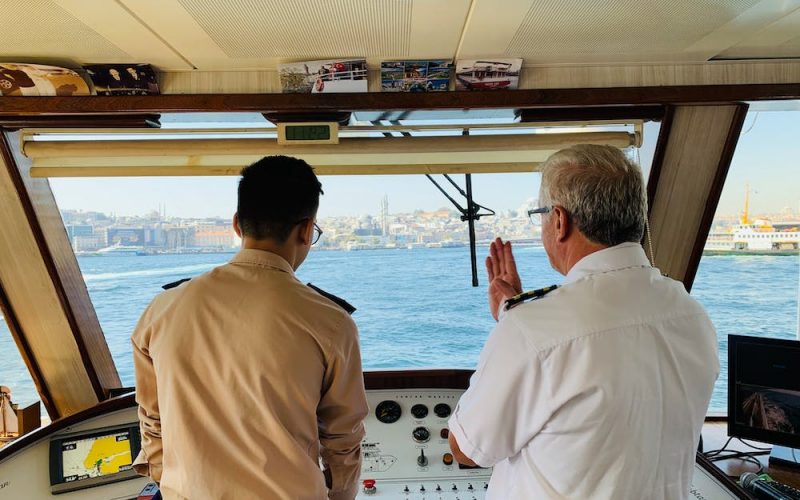As any traveler will tell you, the world is filled with a stunning mix of rich cultures, from the ancient civilizations of the Mediterranean to the vibrant, indigenous traditions of South America. As cruising becomes a more popular and accessible mode of travel, discovering the world’s diverse cultures will become as easy as saying “bon voyage.”
But visiting foreign cultures and embracing them with respect are two different things, and in this blog, I will share why and how to treat unfamiliar cultures with respect when traveling abroad.
Before I get into my advice for interacting with new cultures, it’s important to ask yourself one simple question: why is it important to know how to respectfully engage with foreign cultures?
Think of it this way: traveling abroad and visiting new places is much like being invited to a stranger’s home for the first time. When someone invites you into their home, it is common courtesy to treat their space with respect and recognize their customs whether or not you share them. For example, if someone asks you to remove your shoes before entering their house, it is respectful to comply, regardless of whether you follow the same custom in your home. So remember: when you visit a new place, you enter somebody’s home.
Now, let’s get into how you can develop a respect for the foreign cultures you encounter on vacation.
Do Your Research

The first thing I recommend when embarking on an international trip is to research the cultures you’ll be interacting with in advance. Consider this another way of preparing for vacation, like laundry and packing your suitcase. Lean into your curiosity here and remember there is no wrong way to do this.
If you’re unsure what to research, here are a few jumping-off points you can use: what language(s) do they speak? What is the most common religion? Is the region a tourism hotspot, or somewhere off the beaten path? Are they a more reserved, conservative culture or are they more open? What is the country’s relationship like with your home country? Are there areas of this country that are unsafe for tourists?
While this research might seem overwhelming at first, it’s helpful to know that much of this information can be found on your home country’s State Department website. However, a simple Google search will yield a plethora of helpful information as well. You can also consider watching some travel vlogs on YouTube showcasing this destination so you can get a better idea of the tourist experience.
Lastly, it can be helpful to relate your research to your interests. For example, if you’re a passionate soccer fan, why not look up the country’s national team and watch some games? Or, if you’re into literature, try reading a popular novel set in the location so you can get a firsthand feel of the culture. The options here are truly endless.
Learn the Local Language

Suppose you’ve decided to travel to a destination where locals speak a different language. In that case, it can be helpful to spend a few weeks before you leave learning basic phrases and vocabulary. You don’t need to push yourself to attain any level of fluency (unless, of course, you want to), but familiarizing yourself with basic greetings will go a long way not only in helping you to feel more knowledgeable and secure but also in helping you to connect more easily and more deeply with the locals you encounter. If you’re interested in learning more about how to learn a foreign language effectively, check out this blog I wrote about it.
Furthermore, greeting someone in their native language is a sure sign of respect, for it demonstrates that you have taken the time to learn something new. It also illustrates an openness to the culture that will not go unnoticed, because in many situations, it’s not what you say but how you say it that people pick up on.
This brings me to my next point, which is about the importance of communicating openly and kindly with the locals. When you find yourself in an open-air market in Morocco, for example, approach each vendor with courtesy and respect, even if you don’t speak the local dialects of Arabic or French fluently. You will ikey encounter difficulties in communicating, but it’s important not to take that frustration out on your interlocutor. Remember, you are a guest in their country, and it is not their responsibility to explain away your ignorance or confusion.
Use the information you researched about the culture before you left to adhere to the local social cues and mores, and, above all, don’t close yourself off to locals merely because you don’t speak the same language. A smile and a warm attitude are both part of the universal human language that we all have access to; use them.
Lead With Empathy

Last but not least, one of the best advice I can give prospective international travelers is this: lead with empathy. If you cultivate one good habit before you leave, make it this one. Exploring new cultures will expose you to new ideas, perspectives, and behaviors, which is only sometimes a comfortable experience. But suppose you enter these experiences with a dedication to remain compassionate, open, and empathetic towards the people and the customs you encounter. In that case, you will be rewarded tenfold with kindness in return.
At the end of the day, just because a culture lives differently than you doesn’t mean that it doesn’t deserve respect. As I mentioned above, visiting a foreign country is like stepping into somebody’s home for the time. It’s imperative that you be mindful of the local customs, you treat your hosts with respect, and you allow yourself to venture into new, unfamiliar environments with an open heart and open mind. After all, that is what traveling is all about.
So when you book your next international cruise vacation, be sure not to leave your kindness and respect at home.










